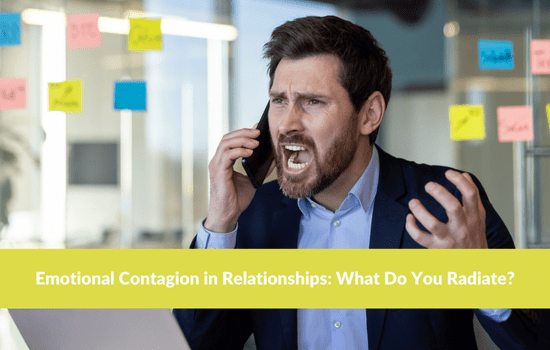Have you ever noticed how someone's mood can quickly affect the atmosphere in a room? It's crucial to appreciate the impact of emotional contagion on others. Emotions are a significant driver of our behaviour and are hard-wired to cause us to react before considering the situation rationally. Therefore, understanding and effectively managing emotional contagion is essential to developing emotional intelligence and fostering healthier relationships.
Emotional Contagion: How Your Mood Impacts Those Around You

Our emotions can spread like wildfire, and understanding the type of emotional contagion you radiate is more critical than ever. Emotional contagion is a fascinating phenomenon where one person's emotions and related behaviours directly trigger similar emotions and behaviours in other people. This invisible yet powerful force shapes our interactions, influences our relationships, and affects the atmosphere in our homes, workplaces, and social circles.
Here's Examples Of How Emotional Contagion Works
Have you ever noticed how a smile from a stranger can lift your spirits or how a colleague's stress can make you feel tense? These are examples of emotional contagion in action. By becoming aware of the type of emotional energy you radiate, you can increase your emotional intelligence and harness this knowledge to create positive, supportive environments for yourself and those around you. In this blog, we view the science of emotional contagion, explore the different types of emotional energy, and provide practical tips for cultivating and spreading positivity. Let's discover what kind of emotional contagion you radiate and how you can use it to enhance your life and the lives of others.
What's Emotional Contagion?
Wikipedia states, "Emotional contagion is the phenomenon of having one person's emotions and related behaviours directly trigger similar emotions and behaviours in other people."
How Your Emotions Drive Your Behaviour
Developing emotional intelligence is the key to understanding how emotions drive your behaviour. Emotional intelligence involves recognizing, understanding, and managing one's own emotions and empathizing with the feelings of others.
Understanding Emotional Intelligence
Emotional intelligence (EI) is crucial in navigating interpersonal dynamics. It empowers individuals to recognize emotional triggers, manage responses effectively, and foster healthier relationships.
Practical Steps to Enhance Emotional Intelligence
Here are some steps to help you become more aware of the emotional drivers behind your actions:
-
Self-Reflection: Regularly reflect on your feelings and reactions. Ask yourself, "Why did I react that way?" or "What am I feeling right now?"
-
Mindfulness Practices: Engage in mindfulness techniques such as meditation, deep breathing, or journaling. These practices can help you stay present and more attuned to your emotional state.
-
Identify Triggers: Pay attention to situations or people that trigger strong emotional responses in you. Understanding your triggers can help you anticipate and manage your reactions.
-
Label Your Emotions: Identify and label your emotions accurately. Instead of saying, "I feel bad," try to be more specific, like "I feel frustrated" or "I feel anxious."
-
Body Awareness: Notice physical sensations that accompany your emotions. For example, tension in your shoulders might indicate stress or anxiety.
-
Track Patterns: Keep a journal to track your emotions and behaviours over time. Look for patterns that reveal how certain emotions consistently drive specific behaviours.
-
Seek Feedback: Ask trusted friends, family, or colleagues about your emotional responses and behaviours. Others can often see patterns that you might miss.
-
Practice Empathy: By understanding the emotions and perspectives of others, you can gain insights into your emotional responses and improve your interpersonal interactions.
-
Develop Coping Strategies: Learn and practice healthy coping mechanisms for managing intense emotions, such as taking a walk, listening to music, or talking to a friend.
-
Professional Help: If you find it challenging to manage your emotions, consider seeking help from a therapist or counsellor who can provide guidance and support.
By cultivating these practices, you can increase your emotional intelligence, become more aware of how your emotions influence your behaviour, and make more conscious, intentional choices in your daily life.
The Impact of Negative Emotional Contagion
Negative emotional contagion can significantly impact others in various ways, influencing their emotional well-being, behaviour, and overall environment. Here are some of the critical effects:
-
Increased Stress and Anxiety
-
Decreased Productivity
-
Strained Relationships
-
Emotional Exhaustion
-
Adverse Physical Health Effects
-
Reduced Empathy and Compassion
-
Impaired Social Dynamics
-
Influence on Behaviour
-
Dampened Innovation and Creativity
To reduce the impact of negative emotional contagion, it's essential to foster a supportive and positive environment, practice emotional regulation, and promote open and empathetic communication. Encouraging a culture of positivity and resilience can help counteract the spread of negative emotions and their effects.
We encourage our clients to observe their emotional reactions and work to realign them with alternative ways to communicate and manage their behaviour to deliver positive results. Understanding how your emotions impact you and others, including your team, will significantly improve relationships, morale and productivity. To learn more about emotional contagion and develop self-awareness to enhance your emotional intelligence, consider signing up for our Emotional Intelligence Assessment & Coaching.
Explore deeper insights into mindfulness and emotional regulation in my book, The Power of Emotion. Marshall Connects offers Emotional Intelligence Assessments and Coaching to enhance skill development in all areas, including self-management techniques for successfully regulating your emotions to improve your life and overall productivity. Contact us today to take the next step in your emotional intelligence journey.
This article was originally published on February 2, 2018, and has been updated (July 2024).
More Motivational Reads Here »
How Emotionally Intelligent Are You?
Sign up for Linda's monthly tips to build your Emotional Intelligence and reduce Emotional Hijacking!

















